Related Research Articles
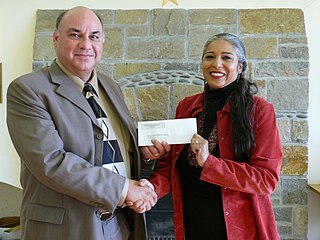
The Wampanoag, also rendered Wôpanâak, are a Native American people of the Northeastern Woodlands currently based in southeastern Massachusetts and formerly parts of eastern Rhode Island. Their historical territory includes the islands of Martha's Vineyard and Nantucket.
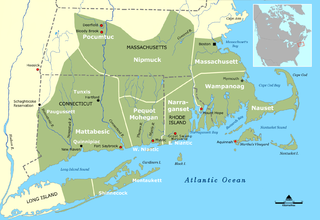
The Massachusett were a Native American tribe from the region in and around present-day Greater Boston in the Commonwealth of Massachusetts. The name comes from the Massachusett language term for "At the Great Hill," referring to the Blue Hills overlooking Boston Harbor from the south.
Praying Indian is a 17th-century term referring to Native Americans of New England, New York, Ontario, and Quebec who converted to Christianity either voluntarily or involuntarily. Many groups are referred to by the term, but it is more commonly used for tribes that were organized into villages. The villages were known as praying towns and were established by missionaries such as the Puritan leader John Eliot and Jesuit missionaries who established the St. Regis and Kahnawake and the missions among the Huron in western Ontario.
State-recognized tribes in the United States are organizations that identify as Native American tribes or heritage groups that do not meet the criteria for federally recognized Indian tribes but have been recognized by a process established under assorted state government laws for varying purposes or by governor's executive orders. State recognition does not dictate whether or not they are recognized as Native American tribes by continually existing tribal nations.
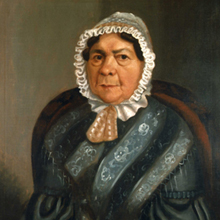
The Nipmuc or Nipmuck people are an Indigenous people of the Northeastern Woodlands, who historically spoke an Eastern Algonquian language, probably the Loup language. Their historic territory Nippenet, meaning 'the freshwater pond place', is in central Massachusetts and nearby parts of Connecticut and Rhode Island.
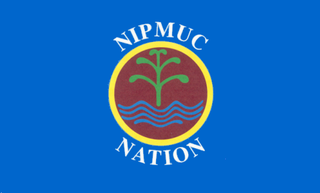
The Nipmuc Nation was a non profit entity of the state-recognized tribe Hassanamisco Nipmuc, an Indigenous people of the Northeastern Woodlands based in South Grafton, Massachusetts.

In the United States, an American Indian tribe, Native American tribe, Alaska Native village, Indigenous tribe, or Tribal nation may be any current or historical tribe, band, or nation of Native Americans in the United States. Modern forms of these entities are often associated with land or territory of an Indian reservation. "Federally recognized Indian tribe" is a legal term in United States law with a specific meaning.

Myles Standish Hall is a Boston University dormitory located at 610 Beacon Street, in Kenmore Square. Originally constructed in 1925 and opened as the Myles Standish Hotel, it was deemed to be one of the finest hotels in the world. In 1949 BU acquired the building and converted it into a dormitory.

Praying towns were settlements established by English colonial governments in New England from 1646 to 1675 in an effort to convert local Native Americans to Christianity.
The Algonquian Confederacy of the Quinnipiac Tribal Council (ACQTC) is a cultural heritage group and nonprofit organization of individuals who identify as descendants of the Quinnipiac people. They are based in Milltown, Indiana, but also hold events in Connecticut.

Moswetuset Hummock is a Native American site and the original name of the tribe (Mosetuset) in the region named Massachusetts after them. The wooded hummock in Squantum, Massachusetts, is formally recognized as historic by descendants of the Ponkapoag people.

Native American tribes in Massachusetts are the Native American tribes and their reservations that existed historically and those that still exist today in what is now the Commonwealth of Massachusetts. A Narragansett term for this region is Ninnimissinuok.
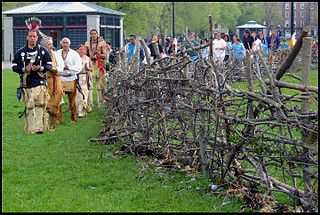
Ancient Fishweir Project is a collaborative group that creates an annual public art installation on Boston Common.

Ponkapoag, also Punkapaug, Punkapoag, Ponkhapoag or Punkapog, is the name of a Native American "praying town" settled in the late 17th century western Blue Hills area of eastern Massachusetts by persons who had accepted Christianity. It was established in 1657, during the colonization of the Atlantic seaboard of the United States by settlers from Britain. This was the name given to the winter residence of the group of Massachusett who lived at the mouth of the Neponset River near Dorchester in the summer, in what colonists called Neponset Mill.
The Nulhegan Band of the Coosuk Abenaki Nation is a state-recognized tribe and nonprofit organization, called AHA "Abenaki Helping Abenaki", whose headquarters and land are based in Vermont. They are often referred to as the Nulhegan Abenaki Tribe or simply, Nulhegan.

The Praying Indians of Natick and Ponkapoag is a cultural heritage group that claims descendancy from Praying Indians in Massachusetts, including the Massachusett people, an Indigenous people of the Northeastern Woodlands.
The Praying Indians of Natick were a community of Indigenous Christian converts, known as Praying Indians, in the town of Natick, Massachusetts, one of many Praying Towns. They were also known as Natick Indians.
The Accohannock Indian Tribe, Inc. is a state-recognized tribe in Maryland and a nonprofit organization of individuals who identify as descendants of the Accohannock people.
The Herring Pond Wampanoag Tribe is a cultural heritage group that claims descent from the Wampanoag people based in Plymouth, Massachusetts. They have a nonprofit organization, the Herring Pond Wampanoag Tribal Council, Inc.
References
- 1 2 3 "Massachusetts Ponkapoag Tribal Council Inc". ProPublica. Retrieved 8 June 2024.
- ↑ "We are the Descendents [sic]". The Masschusett Tribe at Ponkapoag. Retrieved 6 November 2021.
- ↑ "Indian Entities Recognized by and Eligible To Receive Services From the United States Bureau of Indian Affairs". Indian Affairs Bureau. Federal Register. January 29, 2021. pp. 7554–58. Retrieved 6 November 2021.
- ↑ "State Recognized Tribes". National Conference of State Legislatures. Retrieved 6 November 2021.
- 1 2 3 "Massachuset-Ponkapoag Tribal Council, Inc. The". OpenCorporates. Retrieved 8 June 2024.
- 1 2 3 "Massachusetts-Ponkapoag Tribal Council Inc". Guidestar.
- 1 2 3 "Ponkapoag Land Corporation". OpenCorporates. Retrieved 6 November 2021.
- ↑ Herszenhorn, Miles J.; Yuan, Claire (September 29, 2023). "As it Happened: Harvard President Claudine Gay's Inauguration". The Harvard Crimson. Retrieved 15 December 2023.
- ↑ Carmosino, Elyse (October 9, 2020). "Salem to celebrate inaugural Indigenous Peoples' Day". The Daily Item. Essex Media Group. Retrieved 15 December 2023.
- ↑ Solomon, Elizabeth (June 28, 2020). "Massachusett-Mascot-letter.pdf" (PDF). MA Indigenous Legislative Agenda. Retrieved 6 November 2021.
- ↑ Trufant, Jessica (October 9, 2021). "New panels shed light on Weymouth's 'sordid past,' history of Massachusett Tribe". The Patriot Ledger. Retrieved 6 November 2021.
- ↑ "Native American Tribe Wants BU To Change Name Of Myles Standish Dorm". WBUR. September 21, 2021. Retrieved 6 November 2021.